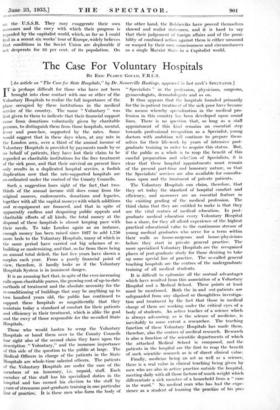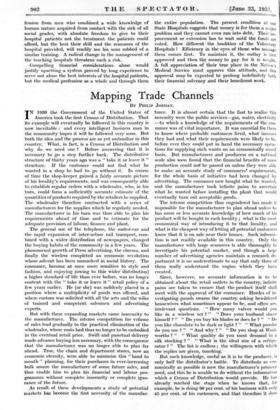The Case For Voluntary Hospitals
BY ERIC PEARCE GOULD, F.R.C.S.
[An article on The Case for State Hospitals," by Dr. Somerville Hastings, appeared in last week's SPECTATOR.] Iis perhaps difficult for those who have not been 1 brought into close contact with- one or other of the Voluntary Hospitals to realize the full importance. of the place occupied by these institutions in the medical . service of the. country. The name " Voluntary '.' was first given to them to indicate that their financial support came from donations voluntarily given by charitable persons, to distinguish them from those hospitals, mental, fever and poor-law, supported by the rates. Some would suggest that in these days when, at any rate in the London area, over a third of the annual income of Voluntary Hospitals is provided by payments made by or on behalf of patients,jher have lost their claim to be regarded as charitable institutions for the free treatment of the sick poor, and that their survival on present lines only results in a duplicated hospital service, a foolish duplication now that the rate-supported • hospitals are co-ordinated under the control of the County Councils.
Such suggestion loses sight of the ,fact,that two- thirds of -ihe annual income still does comp from the original sources, endowments, donations and legacies, together with all-the capital moneys with which additions and re-equipment are financed, and that in spite of apparently endless and despairing public appeals and charitable efforts of all kinds, the total money at the dispoSal of these: hospitals is almost keeping pace with their needs. To take London again as an instance, enough-money has been raised since 1927 to add 1,750 more beds to the Voluntary Hospitals, many of which in the same period have carried out big schemes of re- building or modernizing, and that, so far from there being an annual total deficit, the last five years have shown a surplus each year. From a purely fmancial point of view, therefore, it hardly looks as if the Voluntary Hospitals System is in imminent danger.
It is an amazing fact that, in spite of the ever-increasing calls upon charitable purses, the growing cost of up-to-date methods of treatment and the absolute necessity for the re-conditioning of buildings that may be anything up to two hundred years old, the public has continued to support these hospitals so magnificently that they maintain today a standard of comfort for their patients and efficiency in their treatment, which is alike the goal and the envy of -those responsible for the so-called State Hospitals.
Those who would hasten to scrap the Voluntary Hospitals or hand them over to the County Councils lose-sight also of the second claim they have upon the description :" Voluntary," and the immense 'importance of this side of the question to the public at large. The Medical Officers in charge of the patients in the. State Hospitals are whole time salaried officers. The patients of the Voluntary Hospitals are under the care of the members of an honorary, i.e. unpaid, staff. Each member of this staff has his specialized duties in the hospital and has earned his election to the staff by years of strenuous post-graduate training in one particular line of practice. It is these men who form the body of " Specialists " in the profession, physicians, surgeons, gynaecologists, dermatologists and so on.
It thus appears that the hospitals founded primarily forthe in-patient treatment of the sick poor have become the means whereby specialization in the medical pro- fession in this country has been developed upon sound lines. There is no question that, so long as a staff appointment of this kind remains an essential step towards professional recognition as a Specialist, young doctors with ambition will continue to prepare them- selves for their life-work by years of intensive post- graduate training in order to acquire this status. But, if the public as a whole is to reap the benefit of this careful preparation and selection of Specialists, it is clear that these hospital appointments must remain of the present part-time and honorary nature, so that the Specialists' services arc also available for consulta- tions upon and the treatment of private patients. • The Voluntary Hospitals can claim, therefore, that they set today the -standard. of hospital comfort and efficiency, and moreover arc an essential feature in the existing grading of the medical profession. The third claim that they are entitled to make is that they are the vital centres of medical education. In post- graduate medical education every Voluntary Hospital has a share, for they all afford experience of the highest practical educational value to the continuous stream of young medical graduates who serve for a term within their walls as house-surgeons 'and bous&physicians before they start in private general practice. The more specialized Voluntary Hospitals arc the recognized places of post-graduate study for those desiring to take up some special line of practice. The so-called general teaching hospitals are the centres of the undergraduate training of all medical students.
It is difficult to epitomize all the mutual advantages which have resulted from this association of a Voluntary Hospital and a Medical School. These points at least must be mentioned. Both the in and out-patients are safeguarded from any slipshod or thoughtless' investiga- tion and treatment by the fact that those in medical charge of them arc working tinder the critical eyes of a body of students. An active teacher of a science which is always advancing, as is the science of medicine, is inevitably to some extent a researcher. The teaching function of these Voluntary Hospitals has made them, therefore, also the centres of medical research. Research is also a function of the scientific departments of which the attached Medical School is composed, and the patients in the hospital are the first. to reap the benefit of such scientific research as is of direct clinical value. Finally, medicine being an art as well as a science, there is a real value in clinical teaching 'being given by men who are also in active practice outside the hospital, meeting daily with all those factors of much weight which differentiate a sick member of a household from a " case in the ward." No medical man who has had the expe- rience as a student of learning the practice of his pro;, fession from men who combined a wide knowledge of human nature acquired from contact with the sick of all social grades, with absolute freedom to give to their hospital patients not the treatment the patients could afford, but the best their skill and, the resources of the hospital provided, will readily see his sons robbed. of. a similar training. A radical change in the management of the teaching hospitals threatens such a risk.
Compelling financial considerations alone would justify upsetting a system proved by long experience to serve not alone the best interests of the hospital patients, but the medical profession as a whole and through them the entire population. The present condition of our State Hospitals suggests that money is for them a major problem and they cannot even run into debt. Their im. provement or extension has to wait until the funds are voted. How different the tradition of the Voluntary Hospitals ! Efficiency in the- eye& of those who manage them comes first. To maintain it, the outlay is first approved and then the money to pay for it is sought. A full appreciation of their true place in the Nation's Medical Service must approve this attitude, and this approval may be expected to prolong indefinitely both their financial solvency and their beneficent work.









































 Previous page
Previous page